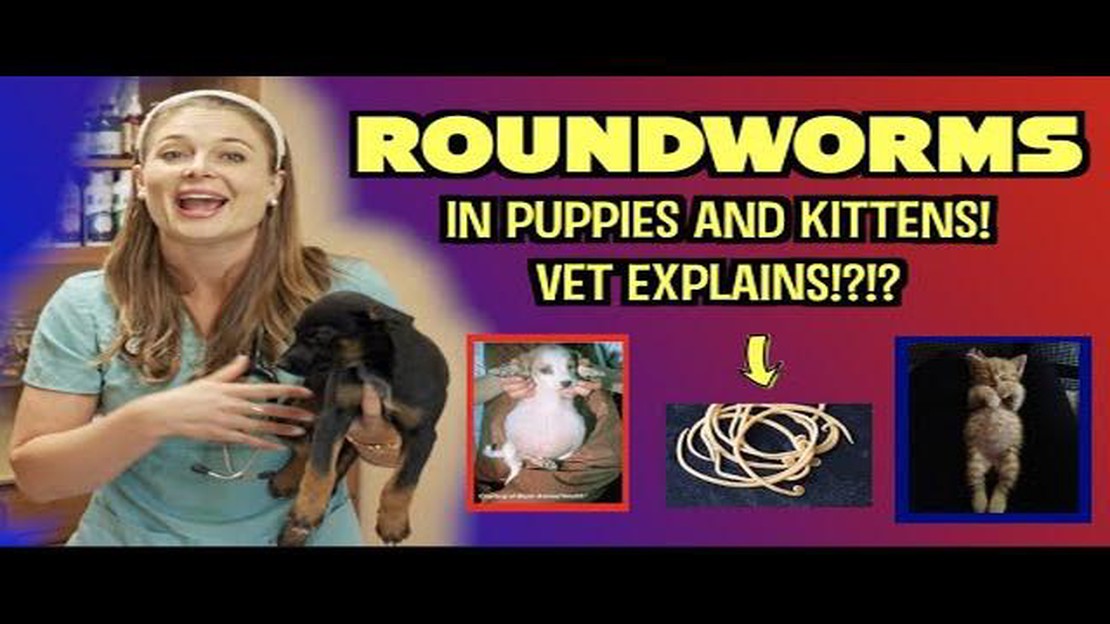Is Human Saline Solution Safe For Dogs Eyes?
Is Human Saline Solution Safe For Dogs Eyes As dog owners, we want to provide the best care for our furry friends, including their eye health. It’s …
Read Article
A bloated stomach in a puppy after deworming can be a cause for concern for pet owners. Deworming is an important part of a puppy’s healthcare routine to eliminate any parasites that may be present in their gastrointestinal system. However, it is not uncommon for puppies to experience stomach bloating and discomfort after being dewormed.
One of the main causes of a bloated stomach in puppies after deworming is the medication itself. Deworming medications work by killing and expelling the parasites from the puppy’s system. As the parasites die off, they release gases and toxins that can cause a bloated sensation in the stomach. This bloating can be accompanied by other symptoms such as diarrhea, vomiting, and lethargy.
Another possible cause of bloating in puppies after deworming is the disruption of the natural balance of bacteria in the gut. Deworming medications can kill off not only the parasites but also the beneficial bacteria that play a crucial role in digestion. Without these bacteria, the puppy’s digestive system may have difficulty breaking down food properly, leading to bloating and digestive discomfort.
It is important for pet owners to monitor their puppy’s symptoms closely and seek veterinary advice if the bloating persists or becomes severe. Treatment options may include providing a bland diet to aid digestion, probiotics to restore the balance of gut bacteria, and medication to alleviate discomfort. Additionally, pet owners should ensure that the puppy is well-hydrated and provide plenty of water to prevent dehydration.
There are several potential causes for a puppy’s stomach to become bloated after deworming:
If you notice that your puppy’s stomach is bloated after deworming, it is important to monitor their symptoms and contact a veterinarian if you have any concerns. They can provide guidance on whether the bloating is expected or if further treatment is needed.
After deworming, it is possible for a puppy’s stomach to become bloated. This bloating can be caused by several factors and can lead to discomfort and pain for the puppy.
Read Also: How Long Do Dogs Bleed After Giving Birth: A Complete Guide
If you notice any of these symptoms in your puppy after deworming, it is important to consult a veterinarian. They will be able to assess the situation and provide appropriate treatment to alleviate the bloating and any underlying issues.
When a puppy’s stomach becomes bloated after deworming, it is important to provide proper treatment to alleviate their discomfort and promote their recovery. Here are some steps to take:
Remember, it is crucial to consult with a veterinarian if you notice any concerning symptoms or if the puppy’s bloating does not improve. They will be able to provide expert guidance and tailor the treatment plan according to the puppy’s specific needs.
Proper care and precautions can help prevent a puppy’s stomach bloating after deworming. Here are some steps you can take:
Read Also: Why Do Puppies Itch When They Shed Their Puppy Coat? The Essential Guide
By following these preventive measures, you can help reduce the risk of stomach bloating and other digestive issues in your puppy after deworming. Remember to consult with your veterinarian for personalized advice and guidance.
Yes, it is normal for a puppy’s stomach to be bloated after deworming. The medication used to deworm the puppy can cause gas and bloating as it works to eliminate the worms from the digestive system.
The common causes of a bloated stomach in puppies after deworming are the medication used for deworming, which can cause gas and bloating, as well as the presence of worms in the digestive system.
The symptoms of a bloated stomach in puppies after deworming may include abdominal discomfort, a visibly distended stomach, decreased appetite, excessive gas, and occasional vomiting.
To treat a bloated stomach in your puppy after deworming, you can try feeding small, frequent meals of easily digestible food, avoiding foods that may cause gas, providing plenty of fresh water, and monitoring the puppy’s condition. If the bloating persists or if you notice any concerning symptoms, it is best to consult a veterinarian for further evaluation and treatment.
You should be concerned about your puppy’s bloated stomach after deworming if it is accompanied by severe pain, inability to pass gas or stool, persistent vomiting, or if the bloating worsens or does not improve with time. These could be signs of a more serious condition that requires immediate veterinary attention.
Is Human Saline Solution Safe For Dogs Eyes As dog owners, we want to provide the best care for our furry friends, including their eye health. It’s …
Read ArticleIs Vegetable Oil Bad For Dogs Dogs are often considered cherished members of our families, so it’s natural for pet owners to want to provide them with …
Read ArticleAre Water Buffalo Ears Safe For Dogs Water buffalo ears have become a popular treat for dogs, but are they safe? It’s important for dog owners to …
Read ArticleWhat Size Crate For 40lb Dog When it comes to crate training your dog, finding the perfect crate size is crucial to ensure the comfort and safety of …
Read ArticleCan You Use A Cat Flea Collar On A Dog If you are a pet owner, you are probably familiar with the nuisance of fleas. These tiny parasites can infest …
Read ArticleCan You Get Pink Eye From Dog Poop Pink eye, also known as conjunctivitis, is a common eye infection that causes redness, itching, and inflammation of …
Read Article